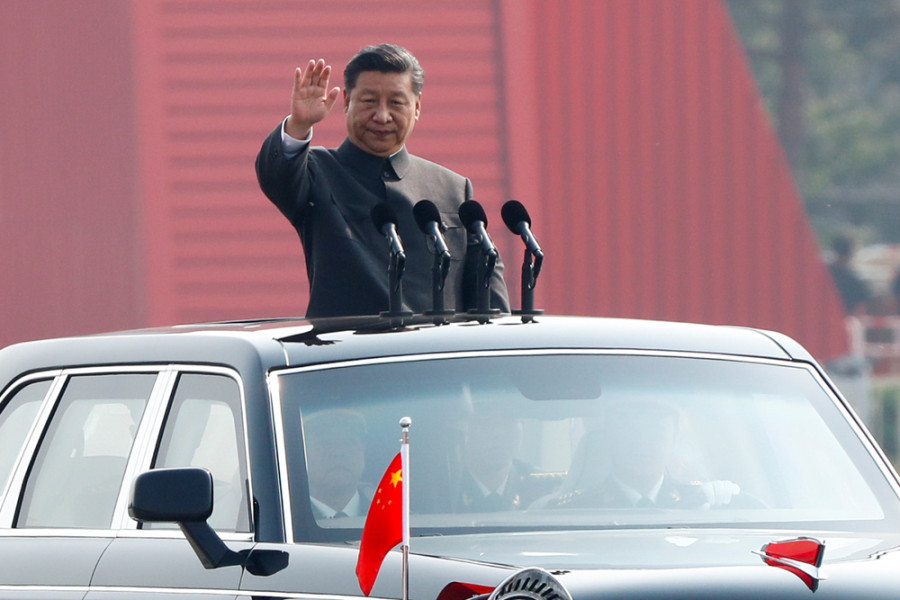Editorial
Walking the tightrope
The Chinese president’s visit is likely to have tremendous political significance but how Nepal calibrates its foreign policy will be key.
Chinese President Xi Jinping will be arriving in Kathmandu today for a two-day state visit at the invitation of President Bidya Devi Bhandari. As the first visit by a Chinese president since Jiang Zemin landed in Kathmandu in 1996, it is likely to have tremendous political significance. Xi, considered the most powerful Chinese leader since Mao Zedong and Deng Xiaoping, wields tremendous power not just in China but across the world. His ambitious flagship project—the Belt and Road Initiative—seeks to connect the region through massive investments in infrastructure projects. Xi, however, has also been heavily criticised for stifling dissent, cracking down on opposition and incarcerating the Uighur Muslims in Xinjiang.
Read: A blueprint for consolidating power: China exports Xi Jinping Thought to Nepal
Ever since bilateral relations were established in 1955, Nepal has done little to displease its large northern neighbour. Nepal has time and again expressed its steadfast adherence to the One-China Policy and ever since the 2015 Indian blockade, Nepal has sought to cultivate better relations with China, albeit as a countervailing force to heavy dependence on India. KP Sharma Oli negotiated a trade and transit agreement with China in 2016 and Pushpa Kamal Dahal enthusiastically signed up for the Belt and Road Initiative in early 2017. Nepal has also long kept its Tibetan refugee population on a tight leash, cracking down on any form of protest against China. More recently, the ruling Nepal Communist Party even conducted a two-day training programme on Xi Jinping Thought—the guiding doctrine of the Communist Party of China. Oli has time and again dangled the carrot of Chinese support to win over the public, promising a cross-border railway connecting Kathmandu with Kerung.
However, little of what was promised has materialised. None of the nine projects identified under the Belt and Road Initiative has moved forward, although that is more Nepal’s fault than China’s. The Chinese have even asked Nepal to be patient as the promised cross-border railway is likely to take a long time. But Nepal’s fascination with China, and especially its economic heft, has continued unabated.
While a visit by the Chinese president is most welcome, Nepal must realise the full extent of Chinese interest in Nepal and the region. For all its economic might, China remains a one-party state with a poor human rights record. Under Xi, the Communist Party of China has cracked down on Uighurs and has provoked Hong Kong into full-blown rebellion. The casus belli for Hong Kong’s revolt was an extradition treaty—a similar treaty is on the agenda of discussion during Xi’s time in Kathmandu. There is little doubt that for China, this treaty is aimed squarely towards Tibetan refugees. Although officials say an agreement on extradition is unlikely, there will come a time when Nepal will have to decide whether Chinese aid is worth compromising on fundamental democratic values. Chinese support might seem like it comes with few strings attached but as many African countries are increasingly finding out, there is always a price to be paid.
This is, of course, not to say that Nepal should reject Chinese aid. It should not. China is a friendly nation and a long-time development partner. Trade between the two countries has reached $1.1 billion and Chinese investments in Nepal exceeded $300 million last year alone. But as China and India vie for greater influence in South Asia, Nepal may increasingly find itself in the geopolitical crosshairs. This tussle for power between the two giants demonstrates that Nepal’s foreign policy has now reached inflection point. Nepal could reaffirm its traditional alignment with India or break from precedent and fortify ties with China.
However, the more prudent strategy would be to maintain its sovereign decision making regardless of Beijing and New Delhi’s interests. Nepal would do well to remember that no great power foreign policy is benign.




 16.12°C Kathmandu
16.12°C Kathmandu














